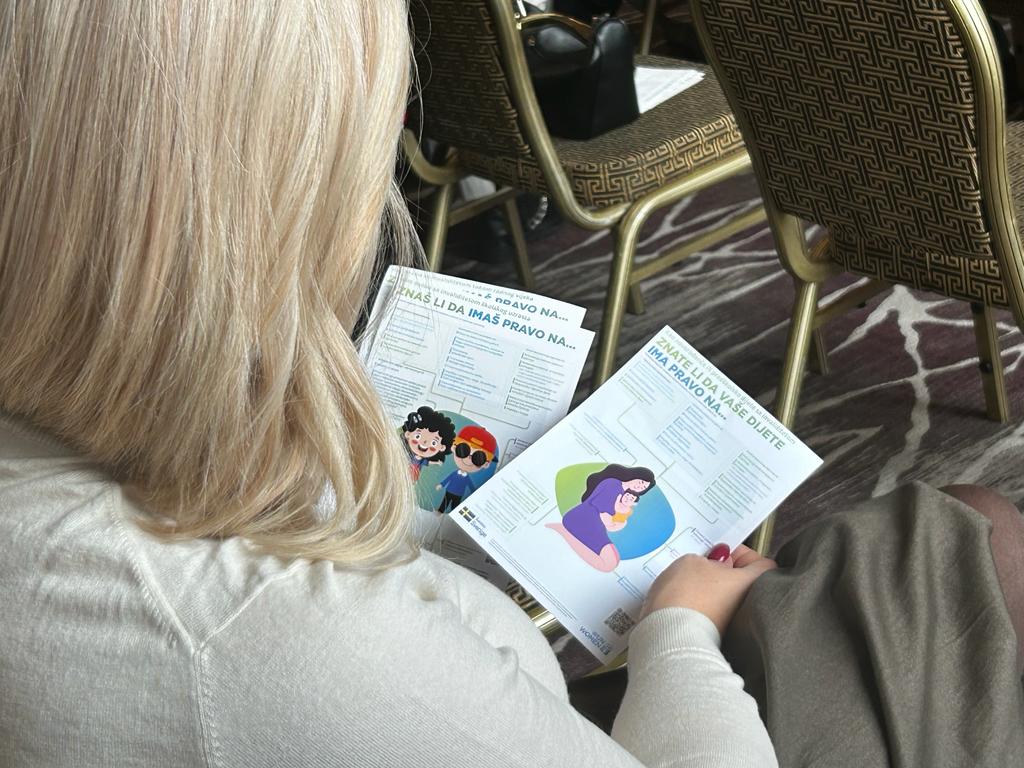A New Interactive Map Enables Easier Access to Social Rights and Services in Bosnia and Herzegovina
Presentation of The Map of Rights and Services for Persons with Disabilities and the Elderly in the Sarajevo Canton
Date:

In Bosnia and Herzegovina, there are various rights and services for persons with disabilities and the elderly; however, the procedures for realizing these rights are often complex and inaccessible. The complexity of administrative procedures often hinders the realization of their rights, making the daily lives of these citizens and their caregivers extremely challenging.
The Map of Rights and Services for Persons with Disabilities and the Elderly in the Sarajevo Canton, officially presented in Sarajevo, Bosnia and Herzegovina, on December 14, will foster easier access to information and documents for the realization of social rights. This interactive map includes all legislative acts and instructions for their easier realization and will soon be available to all citizens of Sarajevo Canton.
The Map is funded by Sweden and developed by UN Women in cooperation with the Sarajevo Economic Institute. “We welcome the initiation of proposed model in Sarajevo Canton, hoping that will facilitate access to services to those who are vulnerable, primarily people with disabilities and elderly. Additionally, successful implementation can lead towards improving the position of women as they will be better placed to reconcile their duties as caregivers and their employment”, said Eva Smedberg, Head of Development Cooperation, Embassy of Sweden.
“UN Women is partnering with the Sarajevo Economic Institute and the Government of Sarajevo Canton to pioneer a comprehensive map of rights and benefits for persons with disabilities, the elderly, and their caretakers”, said Jo-Anne Bishop, UN Women Representative, emphasizing that “the map will ensure a more equitable distribution of care responsibilities and enable women to balance caregiving responsibilities with employment, fostering their economic empowerment.”
Currently, caregivers, mostly family members, especially parents, and particularly women, find themselves in multiple roles as medical caregivers and educators due to the lack of formal institutional support, explained Melika Husić-Mehmedović, representing the Sarajevo Economic Institute. "This dual responsibility often limits women's engagement in the formal labor market, and their valuable contributions remain unrecognized and uncompensated. The comprehensive Map of rights and services for persons with disabilities and the elderly is one of the essential tools that can significantly relieve caregivers, primarily women, and contribute to their economic empowerment."
Following the presentation, a panel discussion titled “Economic Empowerment of Women: Rights and Services that Assist in Care Work” took place. The panel included caregivers, representatives of CSOs, and Municipality Centar Sarajevo.
“The first obstacle that people with disabilities and the elderly encounter when exercising their rights is often the lack of information regarding the rights they can claim, the various procedures involved, the relevant authorities responsible for enforcing these rights, etc. In this regard, the recently created Map of Rights and Services will directly contribute to eliminating this initial barrier that arises when utilizing rights and services. People with disabilities and the elderly have the right to fully participate in public spaces and life, and the Map is one of the steps toward more effective inclusion of these individuals and addressing the issues they face“, said Samir Krivić, presenting Association of those Afflicted with Poliomyelitis, Brain Injuries, and Spinal Cord Injuries in Canton Sarajevo.
Amra Hašimbegović-Vučković, assistant to the Mayor of the Municipality Centar Sarajevo, said that “Municipality Centar Sarajevo conducted research of households that showed that a significant number of citizens were not aware of the possibility of exercising certain rights. Due to citizens' lack of information about the availability of services and rights, earmarked funds remain unspent. Additionally, there is an overload on the administration because citizens do not know where to address their inquiries to obtain the necessary information.”
Responding to these issues, Municipality created the "Guide for Exercising Rights in the Field of Social and Veteran Disability Protection in the Local Community” that will provide clear guidelines, and essential information regarding rights and services that can be obtained in the local community, including the legal basis for exercising these rights, required documentation, and other information needed, emphasized Hašimbegović-Vučković.
Ines Kavalec, director of CSO “Dajte nam šansu”, underlined that we cannot and should not neglect the entire family, when talking about children with developmental difficulties and persons with disabilities. “All existing services within healthcare, education, and social protection lack transparency and a clear sequence of implementation. This leads to dissatisfaction among parents and, consequently, disrupts the functionality of the entire family.”
“Support must be seen in a way that the primary task is to strengthen the parents of children with developmental difficulties, with a special focus on mothers/women. If parents are mentally and psychologically strong, support for children with developmental difficulties will be of higher quality and more successful, contributing to more stable and functional families. A Map of Rights and Services would undoubtedly reduce many difficulties families face and open many questions that would lead to social reform, which is necessary”, concluded Kavalec.
Panel discussion also included Aida Hrnjic, CSO Colibri representative and caregiver, as well as Mia Mrgud and Elma Tunović-Batuša, caregivers, who also emphasized the importance of clear guidelines when it comes to exercising rights and services of people with disabilities and elderly people.
An accessible and comprehensive Map of Rights and Services for Persons with Disabilities and the Elderly in the Sarajevo Canton is one of the essential tools that can significantly alleviate the burden on caregivers, predominantly women, and contribute to their economic empowerment. This is crucial for enhancing the quality of life for persons with disabilities, the elderly, and their caregivers.
The Map was developed under the initiative ‘Translating the Sustainable Development Goals (SDGs) Framework in Bosnia and Herzegovina into sustainable and inclusive growth (SDG2BiH)', funded by Sweden and implemented by UNDP in partnership with UNICEF and UN Women, as part of the overall support of the United Nations extended to the authorities in Bosnia and Herzegovina to implement the SDG Framework in BiH.